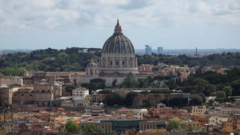As heads of state prepare to attend Pope Francis’s funeral, the event represents both a time for mourning and a potential catalyst for informal diplomatic discussions among world leaders.
Pope Francis's Funeral: A Unique Stage for Unofficial Diplomacy

Pope Francis's Funeral: A Unique Stage for Unofficial Diplomacy
World leaders gather for a solemn occasion, yet behind the scenes, diplomatic dialogues may unfold.
In an unprecedented gathering of global leaders since Queen Elizabeth's funeral, Pope Francis's farewell could become an avenue for unexpected conversations. Though formal meetings are deemed inappropriate for such solemnity, the nature of the occasion allows room for what diplomats refer to as “brush-bys,” where leaders can engage in quick exchanges while waiting for the ceremony to begin.
The event is anticipated to attract around 170 delegations, including 50 heads of state and various monarchs, creating a unique environment ripe for diplomatic connections. While sitting arrangements will see leaders like Presidents Trump and Zelensky positioned adjacent to one another in St. Peter's Square, language protocols could complicate direct interaction. Nonetheless, informal talks may take place outside the ceremony or during their transit to or from Rome, showcasing a willingness from both sides to engage.
Diplomatic officials acknowledge the potential for chance encounters amidst the gravity of the occasion. Yet, some caution exists, particularly regarding the possibility of unwanted confrontations with adversaries. For instance, notable absences at the funeral—such as Russia's President Vladimir Putin and China's President Xi Jinping—will be felt.
Past examples of unexpected interactions abound at significant funerals. The risks and surprises of engaging with global counterparts were highlighted during the funeral of Pope John Paul II, where attendees found themselves in unforeseen exchanges with leaders they may prefer to avoid.
Despite the somber nature of the event, experts in international relations speak to the value of “working funerals,” noting how they may permit leaders to navigate urgent discussions under the auspices of complication-free emotional settings. The gathering may eschew formal outcomes typical of summits, favoring more open-ended diplomatic dialogues amidst shared grief.
As the world watches this historic event unfold, the potential for diplomacy lingers amidst the solemn mourning, illustrating how even in loss, opportunities may arise for deeper global engagement.
The event is anticipated to attract around 170 delegations, including 50 heads of state and various monarchs, creating a unique environment ripe for diplomatic connections. While sitting arrangements will see leaders like Presidents Trump and Zelensky positioned adjacent to one another in St. Peter's Square, language protocols could complicate direct interaction. Nonetheless, informal talks may take place outside the ceremony or during their transit to or from Rome, showcasing a willingness from both sides to engage.
Diplomatic officials acknowledge the potential for chance encounters amidst the gravity of the occasion. Yet, some caution exists, particularly regarding the possibility of unwanted confrontations with adversaries. For instance, notable absences at the funeral—such as Russia's President Vladimir Putin and China's President Xi Jinping—will be felt.
Past examples of unexpected interactions abound at significant funerals. The risks and surprises of engaging with global counterparts were highlighted during the funeral of Pope John Paul II, where attendees found themselves in unforeseen exchanges with leaders they may prefer to avoid.
Despite the somber nature of the event, experts in international relations speak to the value of “working funerals,” noting how they may permit leaders to navigate urgent discussions under the auspices of complication-free emotional settings. The gathering may eschew formal outcomes typical of summits, favoring more open-ended diplomatic dialogues amidst shared grief.
As the world watches this historic event unfold, the potential for diplomacy lingers amidst the solemn mourning, illustrating how even in loss, opportunities may arise for deeper global engagement.





















